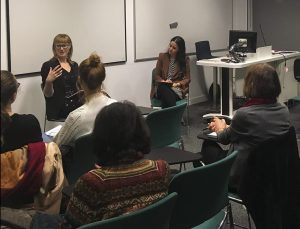A new book by Brandon University (BU) professor Dr. Ariane Hanemaayer challenges some of the core foundations of western medicine.
Dr. Hanemaayer, an Assistant Professor in BU’s Department of Sociology and Gender and Women’s Studies program, authored The Impossible Clinic: A Critical Sociology of Evidence-Based Medicine. Published by UBC Press in October, the book was highlighted recently at an event at the University of Cambridge, where Dr. Hanemaayer holds a visiting fellowship at Wolfson College and the Centre for Research in Arts, Social Sciences and Humanities (CRASSH). The Impossible Clinic will be available in paperback on April 1.
In The Impossible Clinic, Dr. Hanemaayer discusses the shortcomings of evidence-based medicine (EBM), which incorporates the results of scientific research into practice. By looking at historical studies, she examines the roots of EBM and the circumstances that lead to its predominance in western medicine and continued expansion into other regions and health disciplines.
Since its inception, doctors have been worried that EBM results in “cookbook medicine” and encourages rule-following in the clinic that may prevent treatment methods that could be effective for some patients. Dr. Hanemaayer confirms these worries and explains why this has happened. By explaining the links between clinical science and medical regulatory authorities, she opens up a conversation about where EBM fails and how we can get optimal results from the health care system.

Dr. Hanemaayer’s interest in clinical decision-making dates back to her childhood, when being both an athlete and, as she describes, “a sickly child,” she was frequently treated by specialists. Dr. Hanemaayer remembers one occasion, when a doctor dismissed her concerns by telling her the diagnosis was based on “evidence-based medicine,” even though it later turned out to be wrong.
“That conversation stuck with me as I went through my post-graduate education,” Dr. Hanemaayer told CRASSH in a discussion about the book. “After the completion of my PhD, provincial medical colleges in Canada had begun to endorse guidelines, following on the heels of both NICE (National Institute of Health and Care Excellence) in the UK and similar initiatives in the USA. I wanted to understand what that meant and where the rubber met the road, so to speak, between evidence, policy, and regulatory endorsement and the clinic, so I began an archival and historical investigation of the origins of EBM.”
The book release in the United Kingdom paired two Brandon University scholars. Dr. Eftihia Mihelakis, who chairs BU’s Classical and Modern Languages Department and is the Coordinator of the Gender and Women’s Studies program, was in Cambridge to give a research talk. She interviewed Dr. Hanemaayer about The Impossible Clinic in front of an audience as part of the book launch.
Dr. Hanemaayer has been at Cambridge since October 2019, and will continue her work there until the end of August 2020.
“Cambridge is a dynamic and exciting place with many traditions and a structure quite different than BU,” Dr. Hanemaayer said.
“CRASSH is one of the oldest and largest interdisciplinary centres in the humanities, and it is exciting to connect BU to such an extensive international and interdisciplinary network of scholars.”
While at Cambridge, she is working on a research project titled “Opioid Crisis: History, science, regulation,” which takes her research from The Impossible Clinic in a new direction. Having learned that doctors are most likely to be disciplined for clinical judgements regarding opioid prescriptions, she is studying and comparing the opioid crises in Canada, the United States and the UK.
“Dr. Hanemaayer’s work is timely and has abundant applications, both locally and globally,” said Dr. Lisa Robson, Acting Dean of Arts at BU. “Through her book and her research fellowship, Dr. Hanemaayer is gaining experience and perspective that will be tremendously valuable throughout her academic career and is showing that the work of our BU faculty is on par with that of some of the world’s top scholars.”
Contact
- Brandon University
- communications@brandonu.ca
To receive any BU publication in an alternate format please contact Communications@BrandonU.ca
About BU
Success is built at Brandon University. Our growing, progressive campus welcomes a diverse and inclusive community that combines proud tradition with shared ambition. Through our excellence in teaching, research, and scholarship, we educate students to make a meaningful difference as engaged citizens and leaders. Join us at BrandonU.ca.